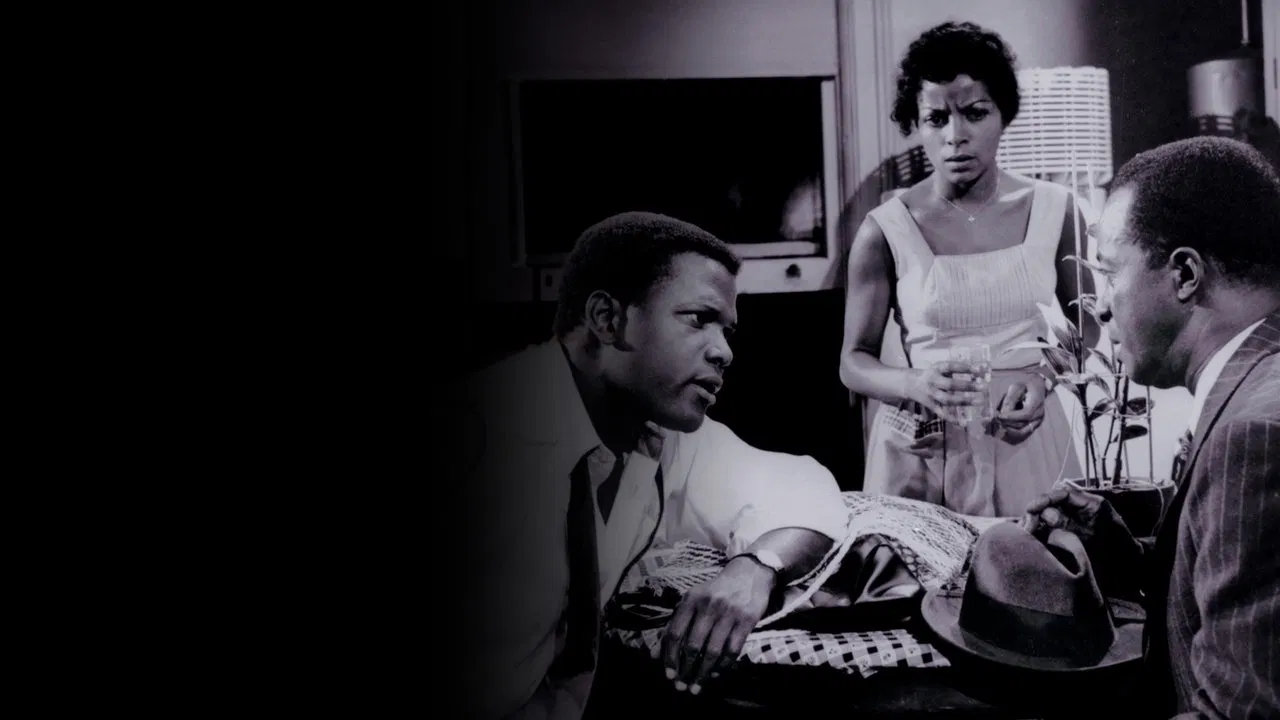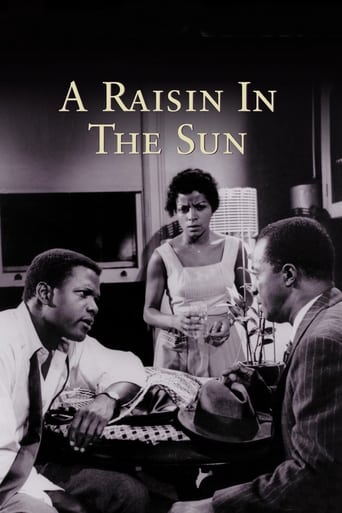Matialth
Good concept, poorly executed.
Jenna Walter
The film may be flawed, but its message is not.
Bob
This is one of the best movies I’ve seen in a very long time. You have to go and see this on the big screen.
mastro726-1
Can see why this movie get's people worked up, because the performances are so over the top, mostly in a good way though. Poitier and Sands are outstanding. Interesting to note that Diana Sands and Ivan Dixon were reunited in a fair last season episode of 'The Fugitive' in 'Dossier On a Diplomat'. My big problem is with the story. I can't get passed the fact of Walter being so reckless with all that money. I mean come on. To just hand over $6,500 in early '60's cash, to a guy to go out of town to "spread some money around" in order to get a licence and go in three ways on a liquor store ? Without going there with him ? Sorry, I don't "buy" that either.
Scott Amundsen
A RAISIN IN THE SUN gives us the happy accident of the complete original Broadway cast delivering the very performances that made the stage play so memorable. This is a masterpiece.Chicago's South side, 1961. We are introduced to the Younger family: Lena (Claudia McNeil), the matriarch, her son Walter Lee (Poitier), his wife Ruth (Dee) and their son Travis (Stephen Perry). Also crammed into the tiny apartment is Walter Lee's sister Beneatha (Sands).The family has been crammed into their small apartment for as long as Walter Lee has been alive. As a result, he is a young man with big dreams. As the play opens, the family is waiting on an insurance check for $10,000.00 left by Walter's father. There is some conflict about the money: Beneatha considers the windfall to be her mother's property, a position that Walter Lee does not exactly share. He has dreams, as we noted before, and one of these dreams is opening a liquor store. The problems with this idea are: 1) Mama is not happy about the idea; and 2) Walter Lee has teamed up and placed his trust in a couple of shady characters.Mama decides to take matters into her all too capable hands: she goes out and comes back to announce that she has put down a down payment on a house for the family.Everyone is thrilled except for Walter, who feels betrayed by his mother and resents her lack of trust in him. Unfortunately, Mama turns out to be right. Walter takes the rest of the money and gives it to one of his associates, who skips town and leaves him stunned, grieving, and penniless. Walter now must face his mother with what he has done, in a climactic and almost violent scene that takes the breath away.Meantime, a fly has found its way into Mama's ointment: a White man named Lindner (John Fiedler) from the Clybourne Park Improvement Association (Clybourne Park being the White neighborhood in which Mama purchased the house). Lindner comes armed with a check for more money than Mama has paid for the house, the motive being to keep the Black family out of their lily White enclave.At the climax of the play it falls to Walter Lee to inform Lindner that they intend to occupy the home. It is one of the most powerful scenes ever put on film. Lindner attempts to "reason with" Mrs Younger but she won't have it; her son is now the head of the family.And as the play winds down, the family packs their things and heads out for their new home. Mama picks up a plant that has come to symbolize the family's struggles, and she, perhaps appropriately, is the last to leave.It's a brilliant film, with brilliant performances and a carefully crafted script. Unforgettable.
SnoopyStyle
Walter Lee Younger (Sidney Poitier) is a chauffeur feeling under the thumb of the ladies in his life. His wife Ruth (Ruby Dee) is pregnant and considering an abortion. His mother and sister Beneatha are also living with them in their apartment in Chicago's south side. His father is recently deceased and his mama is expecting a large insurance cheque. Walter expects to use the money to buy a liquor store but his mother has other thoughts. His sister wants to pay for her education. She has a fight with mama over religion. She brings home Nigerian Asagai who introduces her to Nigerian culture. Her integrated boyfriend George Murchison (Louis Gossett Jr.) is dismissive of any old world culture. Mama buys a house in a white neighborhood to try to pull the family back together. Mark Lindner comes to offer to buy it back to avoid racial tension.This is an important black play and an important black movie. There are a lot of family conflicts in this story. Some of it feels like piling on especially the abortion question. I would like a more simple argument about money. I am also not impressed with Sidney Poitier. He's being whiny. Maybe he is intended to be whiny but it would be better as frustrated anger. For me, the standout is Claudia McNeil playing the mother. She is both powerful and powerless over her children. She is playing on several different levels. The sister also feels whiny but she's younger and it fits more than her brother. There are some interesting work here and an important message in the end.
David Conrad
Segregation looms in the background of "A Raisin in the Sun." It is a silent, almost-invisible menace until its restrictions are challenged. Then it reveals itself as a smiling, soft-spoken white man with a briefcase. This is the external conflict the Younger family must eventually face as they attempt to move upward and outward in society, but the greater part of the film examines rifts within the Younger household itself. Each member of the family has his or her own values and aspirations that arise in part from their differences in age, gender, and education level, and the genius of the script is its ability to show these differences without taking sides. Characters clash over still- controversial topics such as atheism and abortion, making the film strikingly relevant over half a century later.

